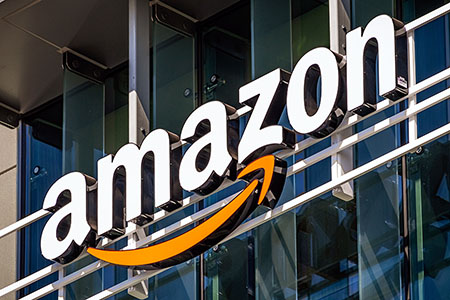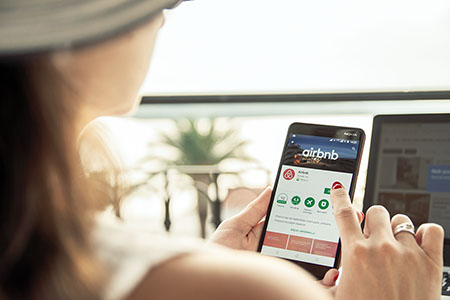
Amazon is getting tangled in the trust economy while Airbnb embraces it
If customers stop believing you, they’ll stop buying. While Amazon struggles with fake products, Airbnb is raising the bar to give guests, hosts, and even neighbors more confidence in its service.
18-Nov-19 – The most critical enabler of e-commerce and so many other tech-centric businesses today is the emergence and continued growth of the trust economy. We’re surprisingly comfortable putting ourselves – and often our offspring – in cars with drivers whose training, credentials, and even honesty are mainly a mystery. Their principal qualification is showing up – usually on time and hopefully sober. We buy products and services from sellers worldwide without a moment’s hesitation, in the good-faith belief that they are what they’re represented to be and that they will be delivered on time and as promised. While sites like The RealReal aggressively stress the authenticity of their used luxury goods and the extent to which they go to verify that fact, most e-commerce sites – and most of us – just take largely for granted the fact that what you see is what you’ll eventually get.
Given what we’re finding out, how much longer can Amazon hang on to the title as the most trusted brand in America? Seems to me that even a golden reputation based primarily on execution and cost considerations is more than a little vulnerable when the goods that are promptly and economically provided turn out to suck or are actually harmful. Cost is what you pay, but true value is ultimately what we’re looking for. As I used to tell my car dealer clients, customers don’t care how fast you fix their cars if you don’t get the job done right. They’d rather wait a while longer than have to bring the beast back to be repaired again. Amazon needs to clean up its Fulfillment by Amazon business, which continues to grow explosively, because shoddy quality control is killing a lot of legitimate players who can’t compete with all the fakes, while slowly impairing our faith in the company as well. Airbnb just raised the bar in the trust economy, and it will be interesting to see how soon all the others step up their game as well. They will probably have a much heavier lift than did Airbnb and, in some cases, not much interest or appetite to open that particular Pandora’s box. I can understand why. Brian Chesky, an Airbnb co-founder and its CEO, announced last week at the DealBook Conference in New York that Airbnb will roll out four service enhancements to provide far greater comfort to all stakeholders. Not just to the guests and the landlords, but also to the residents and regulators in the communities where the business operates as well. The four changes include...
Twitter has opted for veracity, banning blatantly false political advertising, while Facebook sticks to its controversial hands-off position. Google is on the sideline, trying to figure out how to play the issue. Even more importantly, the changes and the challenges that so many of the other tech companies are going to face in upping their “honesty” will be much greater than those faced by Airbnb because basic trust was a critical component of the Airbnb business and a central part of its culture from the beginning. Not that Chesky and his fellow founders, Joe Gebbia and Nathan Blecharczyk, are exceptionally honorable and sincere guys – although maybe they are. But they really had no choice, because delivering the right experience was the whole essence of their business, so they made accuracy, honesty, and integrity all key components of their corporate culture. When you invite someone into your home to sleep in your bed, you’d better get a lot of things right from the get-go including, but not limited to, the breakfast. Where you start the startup journey has a lot to do with where you ultimately end up and what kind of business you build. If you don’t care where you end up, any road will take you there. And, if your North Star is “breaking things” or “asking forgiveness rather than permission” or selling a “raised state of consciousness” instead of speculative real estate space, you can end up building a morally bankrupt business that no one trusts or ultimately believes in. The examples of how to do it wrong are just about everywhere today. There aren’t any real shortcuts to sustainable success and there never have been. The miracle workers and people selling any other story are just shipping snake oil.
This is a leap of faith to be sure, but in listening to the guy who has led the charge for over a decade and done about as well as anyone could – especially in dealing with the occasional serious bumps in the road – you have to believe that he may have the right stuff and the strength and character to get the job done because he’s coming from the right place. If it’s you against the world, it makes a lot of sense to bet on the world. All these guys want to be appreciated and admired – a key part of what drives every entrepreneur. Who doesn’t want to be loved? But trust is a much bigger challenge. Being trusted is a lot harder to achieve than being loved.
By Howard Tullman | Loop North News | h@g2t3v.com
Published 18-Nov-19 1:10 AM
|
Showing posts with label AIRBNB. Show all posts
Showing posts with label AIRBNB. Show all posts
Monday, November 18, 2019
Amazon is getting tangled in the trust economy while Airbnb embraces it
Friday, August 19, 2016
Thursday, August 13, 2015
Friday, January 16, 2015
Why Big Brands Use Indie Artists
In 1989, a professor at the School of Music at Ohio
State University named David Huron penned a paper entitled “Music in Advertising: An
Analytic Paradigm.” In the paper Huron wrote that when it comes to the
use of music in advertising and branding “music can serve the overall
promotional goals in one or more of several capacities.”
Nowhere in his paper,
however, did he write that the music which serves the overall promotional
goals needs to come from an established, big name, big label artist.
On the contrary for it is
the music itself that serves and meets the goals and needs and in the case of
some big name brands, that music comes via independent artists. Brands such as
McDonald’s, Coke, and Airbnb are among the many that utilize indie artists.
And the company that
helps facilitate the use of indie artists with some of the biggest brands in
the world is Music Dealers,
who not all that long ago, proudly announced that they had earned over $15
Million for independent artists all over the world.
“The awe inspiring aspect
of this achievement is that before Music Dealers many of these artists did not
have a foot in the door, let alone a significant source of revenue,” says Eric
Sheinkop, CEO of Music Dealers.
The Benefits of Brands
& Indie Artists
So why would a big brand,
who can theoretically work with any artist, choose to work with an indie
artist, one who may not have the same cache as a more well-known artist?
“For a brand like
Coca-Cola, exploring independent artists provides a deep well of creative
talent, while often providing a more cost effective opportunity to further
leverage both the artist and the music beyond a traditional TV spot,”
said Joe Belliotti,
Head of Global Music Marketing for Coke. “We have found that costs associated
with live performances, streaming concerts, PR events, creation of additional
digital video content can be lower than those same costs associated with more
established talent.
For Deborah Wahl,
CMO, McDonald’s, working with indie artists provides a sense of
adaptability. “Sometimes there’s more room for flexibility, innovation and
co-creation when working with an indie artist,” she told me.
She added that McDonald’s
is also very cognizant of the power of their brand, especially as a means to
aid others adding that the team at McDonald’s also likes sharing
their brand power to help someone else on the way up. “Comes from the
entrepreneurial roots working with so many of our owner/operators who often
started with nothing but a dream!”
Jonathan
Mildenhall, CMO of Airbnb, says indie artists are essential to
their brand. “Working with independent musicians is a key element to our
creative success. Authenticity is central to our brand’s values, and
collaborating with indie artists has helped us put Airbnb’s DNA into every
piece of work that we do.”
People Have Higher
Demands From Brands Nowadays
That line above comes
directly from Sheinkop in speaking about the world brands live in today and the
role music plays when it comes to branding.
“Ads need to do more than
just advertise a product or service. They need to bring real value to their
consumers and music is the strongest way to do it. By using the right track in
a commercial, a brand creates a stronger connection with the viewer that lasts
beyond the 30 seconds that the ad airs. It extends the role of the brand in
their consumers’ lives beyond the product, being a part of daily conversations
and becoming a trusted filter for people to discover new music.”
Powerful words indeed and
echoed by Wahl and Belliotti.
“Music can play a
powerful role is communicating the emotion of the story that we’re trying to
tell,” said Wahl, adding that “it’s important to have the unique music voice
that helps communicate the personality of our brand” and that “music can be as
effective as visuals or copy.”
Belliotti says the role
of music in branding is one of emotion. “Music helps to create a deeper
emotional connection to marketing,” he said. “Music can amplify a brand message
and extend the reach of a marketing campaign into pop culture in ways
traditional advertising does not. Music is as important in connecting the
meaning of and emotion behind a brand with a consumer as a brand’s logo, visual
identity or campaign tagline.”
Subscribe to:
Posts (Atom)
LINKS TO RELATED SITES
- My Personal Website
- HAT Speaker Website
- My INC. Blog Posts
- My THREADS profile
- My Wikipedia Page
- My LinkedIn Page
- My Facebook Page
- My X/Twitter Page
- My Instagram Page
- My ABOUT.ME page
- G2T3V, LLC Site
- G2T3V page on LinkedIn
- G2T3V, LLC Facebook Page
- My Channel on YOUTUBE
- My Videos on VIMEO
- My Boards on Pinterest
- My Site on Mastodon
- My Site on Substack
- My Site on Post
LINKS TO RELATED BUSINESSES
- 1871 - Where Digital Startups Get Their Start
- AskWhai
- Baloonr
- BCV Social
- ConceptDrop (Now Nexus AI)
- Cubii
- Dumbstruck
- Gather Voices
- Genivity
- Georama (now QualSights)
- GetSet
- HighTower Advisors
- Holberg Financial
- Indiegogo
- Keeeb
- Kitchfix
- KnowledgeHound
- Landscape Hub
- Lisa App
- Magic Cube
- MagicTags/THYNG
- Mile Auto
- Packback Books
- Peanut Butter
- Philo Broadcasting
- Popular Pays
- Selfie
- SnapSheet
- SomruS
- SPOTHERO
- SquareOffs
- Tempesta Media
- THYNG
- Tock
- Upshow
- Vehcon
- Xaptum
Total Pageviews
GOOGLE ANALYTICS
Blog Archive
-
▼
2025
(607)
-
▼
September
(27)
- MAGAts
- Whitewashing Charlie Kirk Promotes Political Violence
- Did Trump Just Declare War on the American Left?
- What Happened Yesterday Was NOT About "Freedom."
- NEVER FORGET - NEVER FORGIVE THE ROTTEN SAUDIS WHO...
- Be careful not to inadvertently help sainthood Cha...
- Opinion Max Boot Russia’s drone incursion in P...
- JoJo on Trump
- New INC. Magazine Column from Howard Tullman
- Johnson is a Lying Pedo
- Frank Bruni
- The (Not-So-)Interim Docket
- EZRA KLEIN - VERY TIMELY AND IMPORTANT
- WHERE IS PEDO DON?
- Edwin Eisendrath Trump's cabinet is filled with t...
- https://www.threads.com/@auroradrone/post/DORhxlPD...
- The One Danger That Should Unite the U.S. and China
- JoJo
- Ty Cobb
- Trump has turned the Oval Office into a Las Vegas ...
- How Many...
- FORRINERS
- HOWARD TULLMAN JOINS LISA DENT ON WGN RADIO TO DIS...
- TULLMAN COLUMN IN LOOP NORTH NEWS
- NEW INC. MAGAZINE COLUMN FROM HOWARD TULLMAN
- Trump Train Runs Amok - Weak Stupid Republicans Si...
- More brain worms on the loose
-
▼
September
(27)






























